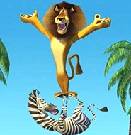|
|
||||
|
|
by Jeffrey Chen  When I think back to Madagascar, the first image I see is that of its co-protagonist, Alex the Lion -- his detailed mane, his meaty paws, his funny expression. This is a good sign; the latest animated movie from DreamWorks is most distinct in its playful visuals and especially so in its character design. Unlike the illogically anthropomorphic fish in Shark Tale, the animals here retain the characteristics of animals, and they exist in the movie almost solely, it seems, to go through the spectrum of computerized 3-D physical motions. The implication here is that there isn't much of a story, and that, believe it or not, has its good side and bad side. In fact, the whole movie can be seen in this way, a constant coin-flip of a project, where good intentions take it in a hopeful direction but the results leave a bit of something to be desired. In terms of its story, Madagascar is admirable in that it doesn't follow any overused formula. However, in the meantime, it doesn't seem to go anywhere else in particular. Having had enough of "be yourself" and "one person can make a difference" stories, I'll have to admit that the unpredictability of Madagascar's plot made me sit up and take notice. Perhaps the most interesting thing about it is that, ultimately, it was about two animals (a lion and a zebra) having a relationship problem because they were, well, animals. The dilemma that Marty the Zebra (voice of Chris Rock) and Alex the Lion (voice of Ben Stiller) face can't be readily applied to human beings, nor is its requisite moral/lesson readily applicable to children. It's like an Aesop's Fable that has no easy parallel to people. The "lesson" itself seems less like a lesson and more like a "solution." Is this a contemporary animated film -- one that doesn't spoon-feed kids or teach the audience anything? Whatever it is, it's not completely satisfactory. However, the movie feels like a step in the right direction, even if it's ultimately a small step. It's more willing to explore the places its subject matter can naturally lead to, as opposed to forcing itself to be another cut cookie. The story, in this case, just serves as a place to spotlight the visuals, and here is another flipping coin. Madagascar boasts a wonderful storybook look, and each of the characters has a distinguishable style with especially good expressions. Nevertheless, originality falters in the movements -- the movie falls prey, once again, to the current trend of hyper, zippy motion, tailored to capture and recapture short attention spans (the best, most fitting movements were reserved for the penguins, who turn out to be among some of the best-rendered 3-D cartoon characters in the current pantheon). I was wondering how nice it would be to take these visuals, the looks of these characters, and have them work in softer, warmer motions. Perhaps that wouldn't have fit the snappy humor, but no one said a comedy about zoo animals who eventually find themselves stranded in Madagascar ought to have snappy humor. I know I'm doing a lot of wishful thinking about all this, but I wouldn't have had any hopes at all about the subject if Madagascar hadn't come along. It's a movie with considerable potential, some realized, the rest falling short. I think the best way to watch it involves not paying so much attention to what's going on, but looking at the stuff that does work. Watch the penguins and see how they stop and spastically wiggle, like actual penguins. Look at the nice landscapes of trees, and the stripe detail on the zebra. I personally kept looking at Alex's mane -- it's lush and soft in the beginning, but becomes more and more frizzy as the movie goes on. There could've been something really good to go along with this artistry, and maybe in the future there will be, but for now this will do. P.S. Warning to parents -- there are scenes in which characters drink water, only to spray it out of their mouths, over and over again. I'd watch out for this sort of scenario infecting the kids with similar urges; beware, or we could have a lot of wet, angry parents on our hands! (Released by DreamWorks and rated "PG" for mild language, crude humor and some thematic elements.) Review also posted on www.windowtothemovies.com. |
||
|
© 2026 - ReelTalk Movie Reviews Website designed by Dot Pitch Studios, LLC |



